Live, before you die.
“Lone Star Barbecue Sauce, the perfect partner for your chicken.”
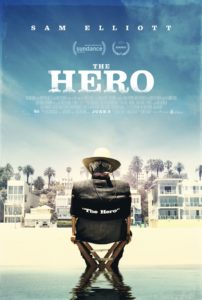 Lee Hayden finishes his four voice-overs and waits for the producer. “That was great Lee, can you do it again?” Which he does. “Lee, one more time.” Which he does. Four more times. Repetition is a hallmark of both Sam Elliott’s washed up Western character and the screenplay written for him, The Hero. In a repeated scene, a man’s body swings limply from a hanging tree, as Elliott’s character ponders the man whose face we cannot see, but we know who it is. Lee is looking at himself. The nightmare is played as an interlude over and over again, reminding the viewer as it reminds the character, he, like everyone, will die.
Lee Hayden finishes his four voice-overs and waits for the producer. “That was great Lee, can you do it again?” Which he does. “Lee, one more time.” Which he does. Four more times. Repetition is a hallmark of both Sam Elliott’s washed up Western character and the screenplay written for him, The Hero. In a repeated scene, a man’s body swings limply from a hanging tree, as Elliott’s character ponders the man whose face we cannot see, but we know who it is. Lee is looking at himself. The nightmare is played as an interlude over and over again, reminding the viewer as it reminds the character, he, like everyone, will die.
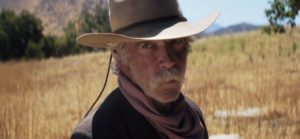 Lee relives scenes from a movie which are at times spliced with the hanging. He is being reminded of his past and the quickly approaching future. Indeed, the movie lingers over the abyss, over the grave, without being maudlin or mawkish. Lee’s character learns early on that cancer – a viral sort – will soon put him in the ground. The early scene where our hero learns of his fate, Elliott’s perfect facial expression expresses the wave of emotion one can only imagine were they to inhabit the same experience. Waves crashing along the shoreline, receding again, are a metaphor for life, and death. The seaside where Lee lives is the prop for his long looks over the horizon. The filmographer records close shots of a man, our “hero,” pensive, reflective, sad, resigned. Lingering along the edges of the film, these shots are markers for us all.
Lee relives scenes from a movie which are at times spliced with the hanging. He is being reminded of his past and the quickly approaching future. Indeed, the movie lingers over the abyss, over the grave, without being maudlin or mawkish. Lee’s character learns early on that cancer – a viral sort – will soon put him in the ground. The early scene where our hero learns of his fate, Elliott’s perfect facial expression expresses the wave of emotion one can only imagine were they to inhabit the same experience. Waves crashing along the shoreline, receding again, are a metaphor for life, and death. The seaside where Lee lives is the prop for his long looks over the horizon. The filmographer records close shots of a man, our “hero,” pensive, reflective, sad, resigned. Lingering along the edges of the film, these shots are markers for us all.
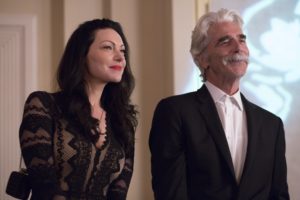 But for a movie where death is uncredited in the script, The Hero is brimming with life. The audience where I saw the movie clapped and laughed through Lee Hayden receiving his lifetime achievement award. We root for a man whose career is considered over when his acceptance speech goes viral over YouTube. We smile when Lee spends hours and hours smoking weed with his pot provider friend (playfully played by Nick Offerman, Elliott’s real life friend). We cheer when Lee finds love with a woman 30 years his junior (Laura Prepon’s smile melts the screen). We exhort when Lee wants to sweep the floor of the mess he’s made with his daughter in touching, real, caring scenes (Krysten Ritter). And we celebrate the life-upon-life connection between Sam Elliott and the writer-director Brett Haley that made this wonderful movie possible. Life facing death is a plot-line we all understand.
But for a movie where death is uncredited in the script, The Hero is brimming with life. The audience where I saw the movie clapped and laughed through Lee Hayden receiving his lifetime achievement award. We root for a man whose career is considered over when his acceptance speech goes viral over YouTube. We smile when Lee spends hours and hours smoking weed with his pot provider friend (playfully played by Nick Offerman, Elliott’s real life friend). We cheer when Lee finds love with a woman 30 years his junior (Laura Prepon’s smile melts the screen). We exhort when Lee wants to sweep the floor of the mess he’s made with his daughter in touching, real, caring scenes (Krysten Ritter). And we celebrate the life-upon-life connection between Sam Elliott and the writer-director Brett Haley that made this wonderful movie possible. Life facing death is a plot-line we all understand.
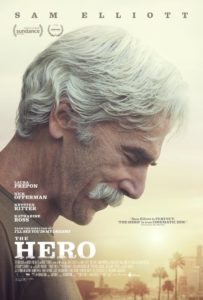 “Lone Star barbecue sauce” makes its repetitious reentry at film’s end, to remind of our own. We have a beginning, a middle, an end. The only question left to answer is, “If we decide to live, how do we keep on living, even if our time is short?” “Give me a chance to write another chapter,” says Lee Hayden to his daughter, wanting to end the repetition of abandonment Lee has created in her life. Life, as it turns out, is the reason for Brett Haley to include the poetry of Edna St. Vincent Millay in his movie. I suspect her collected poems – a copy has rested on my own shelf for years – will fly out of Amazon warehouses. As they should. You see, the reason to see a movie where death has a part is to learn how to live life.
“Lone Star barbecue sauce” makes its repetitious reentry at film’s end, to remind of our own. We have a beginning, a middle, an end. The only question left to answer is, “If we decide to live, how do we keep on living, even if our time is short?” “Give me a chance to write another chapter,” says Lee Hayden to his daughter, wanting to end the repetition of abandonment Lee has created in her life. Life, as it turns out, is the reason for Brett Haley to include the poetry of Edna St. Vincent Millay in his movie. I suspect her collected poems – a copy has rested on my own shelf for years – will fly out of Amazon warehouses. As they should. You see, the reason to see a movie where death has a part is to learn how to live life.
 Mark LOVES movies and believes Sam Elliott is the epitome of a man’s man.
Mark LOVES movies and believes Sam Elliott is the epitome of a man’s man. 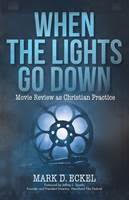 Mark writes this review with deep gratitude for a good man who has made good movies over a good life. This review will also be posted at Zeke Film where you can also see my interview with @JimTudorFilm (here). Dr. Mark Eckel is President of The Comenius Institute (video here) and has written When the Lights Go Down (purchase here).
Mark writes this review with deep gratitude for a good man who has made good movies over a good life. This review will also be posted at Zeke Film where you can also see my interview with @JimTudorFilm (here). Dr. Mark Eckel is President of The Comenius Institute (video here) and has written When the Lights Go Down (purchase here).
Picture credit: imdb.com

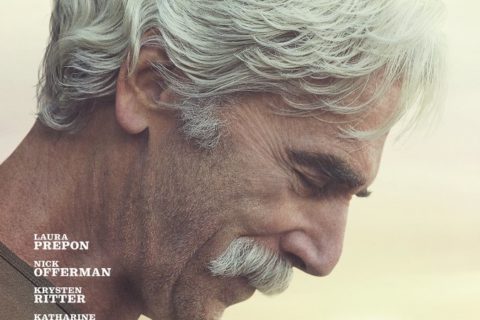
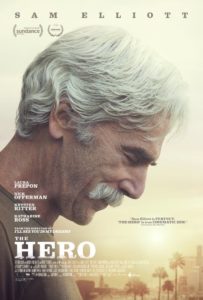
It is one of the best films from USA in a long while. Sam Elliot and Brett Haley deserve a thumbs up…